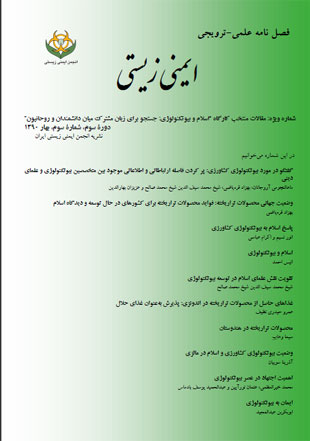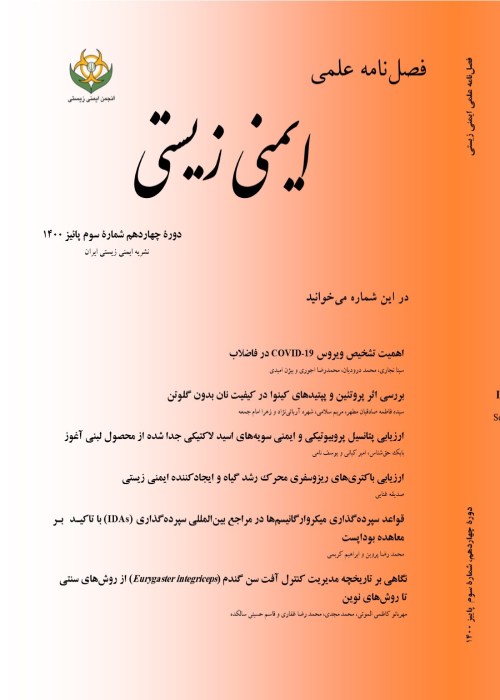فهرست مطالب

فصلنامه ایمنی زیستی
سال سوم شماره 3 (بهار 1390)
- تاریخ انتشار: 1390/01/20
- تعداد عناوین: 12
-
-
صفحه 55
-
صفحه 82
-
صفحه 99
-
صفحه 117
-
Page 5
-
Page 15
Agricultural biotechnology is a rapidly growing technology that has attracted theattention of Islamic countries that are heavily dependent on imported food commoditiesfrom mainly countries that are major producers of genetically modified (GM) cropplants. More than 148 million hectares of GM crops in 29 countries were planted aroundthe world at the end of the year 2010. Rapid growth of this technology is associatedwith some ethical, trade and economic, social, and religious concerns. These concernshave fuelled vigorous debates among various stakeholders. One of the most sensitiveissues for Muslims who constitute more than 26% of global population is thehalal/haram issue. Although, there is no single fatwa against the application of geneticengineering for agriculture in the Islamic world, possible usage of porcine DNA ingenetic modification has become a major juridical deliberations among ulama, in spiteof the fact that it is not being used currently. Therefore, it is instrumental thatdevelopments in biotechnology are openly discussed among the ulama and scientists tocreate awareness on these issues in order to gain the trust and confidence of the“Journal of Biosafety; Volume 3, Number 3, Spring 2011” 16 stakeholders involved. Religious authorities (ulama and Mufties) are considered as one of the key stakeholders particularly in Islamic countries. Although we conclude that Islamic countries are eager to accept foods derived from modern biotechnology as "halal food", but attempts made by anti-biotechnology activists to play up the religious emotions necessitate dialogue among all stakeholders including scientists and ulama.This paper, attempts to describe the necessity of communicating agribiotechnology toIslamic scholars (ulama). Understanding modern biotechnology by Muslim scholars andthe principles of Islamic law (Shariah Principles) by scientists are of paramountimportance for the success of this technology in Islamic world. Basic knowledge onmodern biotechnology will enable ulama to make informed decisions when developingfatwa (Islamic law).
Keywords: Islam, Ulama, Agribiotechnology, GM crops, Communication, Halal food -
Page 25An introduction to agricultural biotechnology and its benefits for developing countries are elaborated. Global status of agricultural biotechnology with emphasis on the growth in area under the transgenic crops is reviewed. Status of modern biotechnology in Islamic countries is presented. This review shows that almost all Muslim countries are involved in one way or another in research and development on agricultural biotechnology. However, so far only four Islamic countries (Iran, Pakistan, Egypt and Burkina Faso) have been able to commercialize any transgenic crop plants. Status of modern biotechnology in Argentina as an example of a non-Muslimdeveloping country is reviewed. Biosafety and religious concerns related to the application of modern biotechnology are elaborated. Finally, attempt to extract Islamic view on the application of modern biotechnology from Holly Quran is made. It is concluded that Islam not only permits but also in some cases urges and even obliges the application of modern tools of science and technology including genetic engineering for the improvement of human livelihood and welfare.Keywords: Iran, GM Rice, Agricultural biotechnology, Iran, Biotechnology
-
Page 45At the outset an introduction to the fundamental techniques and procedures operatingin biotechnology is elaborated. Risk and benefit analysis of agricultural biotechnology isdiscussed with examples and then the ethical questions are listed and possible solutionsare suggested that how Muslims should deal with this phenomenon with guidance frombasic principles of Islam. It is important to emphasize that moral pronouncements andethical values are intimately related to the beliefs, values and composition of anysociety. Islam is today one of the major religions with more than one billion followerswhich are 26% of the total population on the planet. Among every four humans in theworld, one of them is a Muslim. In this paper the response of Muslims to theAgricultural Biotechnology is discussed, and the possibility of adaptation of this newagricultural technology by the Muslim community under the guidance of Islam isexplored.Keywords: Islam, Agricultural Biotechnology, GMO, Ijtihad, Ethics
-
Page 55This paper makes an effort to determine Islam’s relationship and relevance withbiotechnology. Bio-technological advancements have given rise to several pertinentethical and moral issues, which include the legitimacy of biological modification, itsimpact on consumers, environment and eco-system, and so on. While generally aconflict exists between science and religion, unlike some other religious traditions Islammotivates and encourages a comprehensive social development with focus ontechnological development. This paper offers a seven fold global ethical framework asguiding principle for scientific research and development. It argues that in the age ofglobalization, a global ethical paradigm is a rational necessity as basis for reasonedjudgments in bio-technological issues.Keywords: Islam, Agricultural biotechnology, GM food, Ethics, Religion
-
Page 67Biotechnology is a multidimensional discipline of knowledge that has great impactson the society. While it has been acknowledged that biotechnology has great potentialsand benefits, its acceptance in society has been delayed. This paper proposes that theIslamic religious scholars or ulama play an important role in disseminating informationon biotechnology to the masses. The ulama are trusted source of information. Therefore,they have a great role to play towards this end. Two main roles are touched upon in thispaper. Firstly, ulama as a source for providing guidance on biotechnological issues, andsecondly, ulama as influential communicators of biotechnology.Keywords: Biotechnology, communication, ulama
-
Page 75Genetically modified food is referred to food derived from Modern Biotechnology orgenetic engineering. It is readily accepted by the Indonesian consumers. A briefdescription of the fatwa process in Indonesia is given. This relies on tests to pass thehalal criteria and requirements of the halal food. Careful analysis of the technologyprocesses will also shed some light onto the thayyiban (good) aspect of the food. As oneprogressively proceed from the ethical principles to their governance in the managementefforts, one will hopefully confirm the firm and solid acceptability of food derived frommodern biotechnology as halal (lawful) and thayyiban (and good) food in the society.Keywords: Modern Biotechnology, Indonisia, Halal food, Public acceptance
-
Page 82Agriculture is one of the most important sectors of the developing countries. In Indiathe Green, Blue, White and Yellow Revolutions are the example of remarkableaccomplishments and gave enormous confidence to the agricultural scientists andfarmers and enabled the country to attain basic food self sufficiency. The year 1996 canbe considered as a landmark in agricultural biotechnology in general and crop protectionin particular as four transgenic crops comprising three insect – resistant crops (Bt-corn,Bt-cotton and Bt-potato) and a herbicide tolerant soybean, developed by Monsanto,received regulatory approvals in the USA and these were commercially grown on alarge scale for the first time. The year 2009 marked the beginning of the 14thconsecutive year of large scale commercial cultivation of transgenic crops in multiplecountries. In 1996, the area planted with transgenic crops was about 1.7 millionhectares. In a span of about 13 years, the area increased 74-fold, an unprecedentedadoption record for any new technology in agriculture! The number of countriesgrowing transgenic crops which was only 6 in 1996, has reached 25 (10 industrial and 15 developing countries including India) in 2008. The USA is the leading country in the commercial cultivation of transgenic crops followed by Argentina, Brazil, India, Canada, China, Paraguay and South Africa. In India, research on transgenic plant has been going on in several Govt. and private laboratories, since 1995. India made its longawaited entry into commercial agricultural biotechnology in March 2002 with the regulatory approval of three Bt-cotton hybrids incorporated with the Bt gene cry 1Ac, developed by Mahyco-Monsanto, for commercial cultivation. The benefits derived from Bt-cotton included effective control of bollworms resulting in an average yield increase by 13%, reduction in chemical sprays by 39% and net profit to farmers of over Rs. 10,000/hectare as compared to non-Bt counter parts. The cotton production has almost doubled and consequently India which used to record one of the lowest cotton yields in “Journal of Biosafety; Volume 3, Number 3, Spring 2011” 82 the world is now an exporter. In India, Bt-cotton contributed US$840 million or more to National farm economy, resulting in social and economic benefits and also intangible environmental benefits.Keywords: India, Transgenic crops, Bt cotton, Economic benefit, Socio, economic impact
-
Page 92The issue of Halal (permissibility) is very close to Muslim society in Malaysia. Withthe advancement of food technology - such as agribiotechnology - in the world today,Muslim demand answers and explanations on the permissibility of products derivedfrom such technologies. On the other hand, a verified halal certificate for such productsis urgently required. Thus, the government of Malaysia – especially through NationalFatwa Committee, JAKIM etc.- is working to development policy and system for halalcertification in Malaysia. This paper explains briefly the process of halal certification inMalaysia.Keywords: Agricultural biotechnology, GMO, Halal food, Malaysia, Islam, Fatwa
-
Page 99The intention of this paper is to develop some understanding on ijtihad and itsaccompanying principles and to stress its importance to the sphere of biotechnology.Ijtihad occupies a central role in the development of the rulings of shari’ah and theprogress of the ummah. It is the science of shari’ah that prescribes a specific procedurefor the extraction or derives of rulings (istinbat) from the sources of Islamicjurisprudence on matters that are not being specifically ruled by the Quran and Sunnahby scholars called mujtahid. The intention or objectives of shari’ah (maqasid shari’ah)must be found. The age of biotechnology brings many opportunities for improvementsin quality of life. The speed and progress of this technology spark new challenges tomatters which were previously not being ruled. For a simple reason, the subject matterswere not present then. The subject matters are enormous. Opportunities are abundance.These include the production of high quality genetically modified foods; agriculturalbiotechnology; protein engineering; modern gene technology; enzyme technology; newapplications of bacteria; synthesis of new proteins and many other specialized areas ofnew research and developments. Ijtihad plays a very important role in deriving a newshari’ah ruling to ensure that biotechnology based activities and products remain inconformity with the tenets of Islam.Keywords: Ijtihad, Shariah, Islamic Jurisprudence, Biotechnology
-
Page 117Biotechnology refers to the use of biological systems to generate health and agrobasedproducts. Advances in biotechnology not only have led to useful applications butalso posed some ethical issues conundrums. Public awareness and perception of thesafety of biotechnological products and processes appears to be low, especially forhuman use. ‘Genethics’is proposed that applies philosophical and ethical theories tosolve moral dilemmas in gene-based research such as genetic engineering and genetherapy, or cell-based studies like therapeutic and human cloning, and stem cellsresearch. The concept of agroethics is suggested to cater for moral questions in issuespertaining to genetically modified foods. The ethics of marine bioprospecting can belooked at from religious prescriptions. Although biotechnology is perceived as havingled to numerous ethical dilemmas, this discipline has also been instrumental in solvingreligious issues. Two examples are described, one, is the introduction of humanrecombinant insulin that enables Muslim patients to decline porcine-derived insulin, andtwo, the use of recombinant erythropoietin to promote red blood cell formation inpatients whose faith proscribe blood transfusion. In conclusion, though some may claimthat biotechnology seems to challenge faith, it would not hurt to have faith inbiotechnology.Keywords: Islam, Biotechnology, Faith, Genetic engineering, Religion


